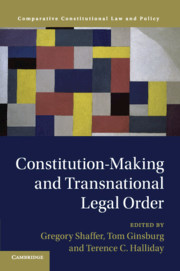Description
Constitution-Making and Transnational Legal Order
Comparative Constitutional Law and Policy Series
Coordinators: Shaffer Gregory, Ginsburg Tom, Halliday Terence C.
Constitutions are no longer exclusively national projects, but increasingly result from broader transnational processes that form a transnational legal order.
Language: English
Subject for Constitution-Making and Transnational Legal Order:
Constitution-Making and Transnational Legal Order
Publication date: 09-2020
Support: Print on demand
Publication date: 09-2020
Support: Print on demand
Constitution-Making and Transnational Legal Order
Publication date: 04-2019
332 p. · 15.6x23.5 cm · Hardback
Publication date: 04-2019
332 p. · 15.6x23.5 cm · Hardback
Description
/li>Contents
/li>Biography
/li>
Since the rise of the nation-state in the nineteenth century, constitutions have been seen as an embodiment of national values and identity. However, individuals, ideas, and institutions from abroad have always influenced constitutions, and so the process is better described as transnational. As cross-border interaction is increasing in intensity, a dominant transnational legal order for constitutions has emerged, with its own norms, guidelines and shared ideas. Yet both the process and substance of constitution-making are being contested in divergent and insurgent constitutional orders. Bringing together leading scholars from the United States, Europe, Latin America, and Asia, this volume addresses the actors, networks, norms and processes involved in constitution-making, as well as the related challenges, from a transnational and comparative perspective. Drawing from the research on transnational legal orders, this work explores and examines constitution-making in every region of the world.
1. Constitution-making as transnational legal ordering Tom Ginsburg, Terence C. Halliday and Gregory Shaffer; 2. Constitutional advice and transnational legal order Tom Ginsburg; 3. A transnational actor on a dramatic stage – Sir Ivor Jennings and the manipulation of Westminster style democracy: the case of Pakistan Harshan Kumarasingham; 4. Constitutions in world society: a new measure of human rights Colin Beck, John W. Meyer, Ralph I. Hosoki and Gili S. Drori; 5. Constitutional dialects and transnational legal orders David Law; 6. Transnational constitution-making: the contribution of the Venice Commission on law and democracy Paul Craig; 7. Worst practices and the transnational legal order (or how to build a constitutional 'democratorship' in plain sight) Kim Lane Scheppele; 8. Democratic erosion and constitution-making moments: the role of transnational legal norms David E. Landau; 9. The possibilities and limits of a constitution-making transnational legal order: the case of Chile Javier Couso.
Gregory Shaffer is Chancellor's Professor of Law, University of California, Irvine School of Law.
Tom Ginsburg is Leo Spitz Professor of International Law at the University of Chicago Law School and a Research Professor at the American Bar Foundation.
Terence C. Halliday is a Research Professor at the American Bar Foundation.
Tom Ginsburg is Leo Spitz Professor of International Law at the University of Chicago Law School and a Research Professor at the American Bar Foundation.
Terence C. Halliday is a Research Professor at the American Bar Foundation.
© 2024 LAVOISIER S.A.S.




